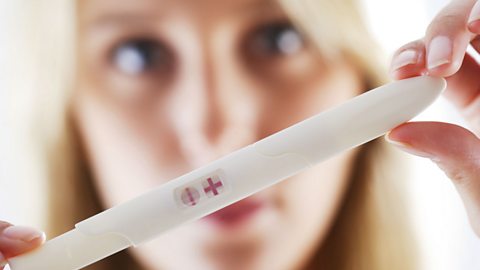Uses of monoclonal antibodies
Pregnancy test kits
Pregnancy test kits use monoclonal antibodyIdentical copies of an antibody produced by fusing a spleen cell with a cancerous white blood cell which can be designed to bind to many different substances.. These have been designed to bind with a hormoneChemical messenger produced in glands and carried by the blood to specific organs in the body. called HCG which is found only in the urine of pregnant women. Monoclonal antibodies are attached to the end of a pregnancy test stick onto which a woman urinates. If she is pregnant, HCG will be present in her urine and will bind to the monoclonal antibodies on the test stick. This will cause a change in colour or pattern which will indicate pregnancy. These specific monoclonal antibodies in the pregnancy test will only bind with HCG.

Cancer diagnosis and treatment
cancerA disease caused by normal cells changing so that they grow and divide in an uncontrolled way. The uncontrolled growth causes a lump called a tumour to form. cells have antigenA protein on the surface of a substance (often a pathogen) that triggers an immune response. on their surface. Monoclonal antibodies can be designed to bind specifically with these antigens. When injected into a person's body, the monoclonal antibodies will bind with these cancer cells and clump them together. This makes it easier to identify a cancerous tumourThe lump of cells formed as a result of uncontrolled cell division., which can then be treated or removed. The antibodies can be made slightly radioactive to allow the cancerous cells to be detected in the body, for example using a PET scanner.
Monoclonal antibodies have also been designed to treat cancer by:
- Carrying drugs that have been attached to them, to the tumour. This means that the drugs specifically target the cancer cells and can allow smaller doses of chemotherapy drugs to be used. This can reduce the side effects and reduce risk to healthy cells.
- Encouraging your immune systemThe body's defence system against entry of any foreign body, including pathogens and agents such as pollen grains. The role of the immune system is to prevent disease. to attack the cancer cells directly.
Other diagnostic uses
Monoclonal antibodies can be made to bind to antigens on blood clots. The monoclonal antibodies can be attached to dyes that will glow fluorescentWhen a chemical absorbs ultraviolet light and releases it as visible light. under UV light or attached to radioactive elements which can be detected with special cameras. This can make locating the clot much easier and can help to speed up how quickly a patient is treated.
Learn more about monoclonal antibodies with Dr Alex Lathbridge.
Listen to the full series on “óĻó“«Ć½ Sounds.
Find out how monoclonal antibodies are made and their use in pregnancy tests and cancer treatment. Listen to the full series on “óĻó“«Ć½ Sounds.